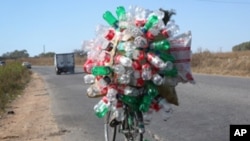Youth from Zimbabwe’s eastern part of the country, Mutare, have beaten unemployment by creating their own jobs, out of something disposed by many as trash – used plastics.
The Mutare Plastics Recycling Center or MPRC, was started in 2014 by about 60 Mutare youth, in their 20s and 30s. However, the business’s slow beginning and hard work slowly reduced that number to a mere eight, who now co-own the business.
Curtis Mudzamiri is the spokesperson of the MPRC’S eight-member company, whose beginning was inspired by the Environmental Management Agency, EMA, the Mutare City Council and the environmental non-governmental organization, Mercy Corps.
“They were together in trying to reduce the waste which was all over the city,” explained Mudzamiri, “so they tried to call us and make up some workshops, then trained us.”
The thinking, Mudzamiri, said was to ensure the eastern border city retained its status of being the cleanest city in the country, by getting rid of waste, most of which would then be recycled.
Mudzamiri said the beginning was challenging, strenuous and laborious, as each member had to personally collect plastic waste by themselves and carry it to their premises at the Mutare Board and Paper Mills in the Nyakamete industrial area and store it before processing.
While many left as a result, Mudzamiri said those who stayed are now reaping the fruits of their labor. He said the group pockets at least US$2,000 after working a good two weeks, money they could only dream about a year ago.
Though successful by their standard, Mudzamiri said the work remains hard, mainly because they are using an old machine in processing and recycling the plastic. He said this means it takes long to recycle plastic waste into chips, pellets and groomlets. The process is slowed even further he explained, by machine breakdowns, which happen often.
“Our machine is obsolete,” Mudzamiri said. “If it was a modern machine, things were going to be easier for us, so that we can quickly generate income. These are many challenges we are facing as we starting the financial crisis, we are not stable.”
Takudzwa Togara, a member of the organization, said modern equipment would also elevate their business, by enabling them to send their finished products straight to the market, instead of going through companies, as they doing, essentially, cutting out the middle man. He said this would increase their profits. In addition, he added, processing finished products in Mutare would also reduce transport costs of taking the plastic pellets, chips and groomlets to Harare.
Mudzamiri said they hope to buy new machines as they continue with their efforts to clean-up the mountainous city. He proudly added too, that MPRC is the only business in town concentrating on recycling, all the while, helping them take care of their families.
“If we get the modern machine, we’d like to improve so we can have our own stand, make our families live better. So these are some of the things we are facing. We have to make sure in future we get things right.”
Kingstone Chitotombe, Manicaland regional manager of EMA, one of the organizations that helped the youth set up the MPRC, said the initiative has not only helped preserve the environment, but created jobs for countless youth of Mutare, keeping them off the streets and away from all sorts of mischief.
“I can give you an example of this one,” Chitotombe said. “It was well received by the community, particularly the youth, because it is creating employment for them. You know nowadays, there’s a challenge of employment, so it’s one way to create employment.”
Meanwhile, Curtis Mudzamiri said he’s urging all youth to emulate their project, join them or start their own projects, to create employment for themselves rather than wait for job interviews when companies are fast closing shop.
“It is good for them to be part of this project, they are very successful project,” he said. “If they stand for things, believe in themselves, things will start to work out.”
Other members of the Mutare Plastic Recycling Centre include Rutendo Chitendero, Ordina Mhlaba, Davison Jahwi, Thulani Marume, McLead Musademba and Levy Jekwa.





